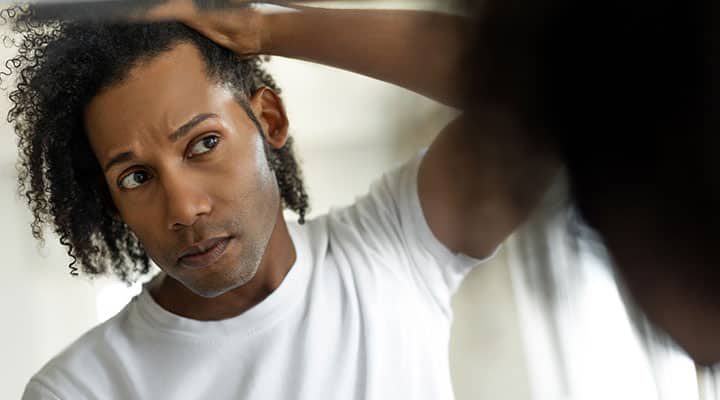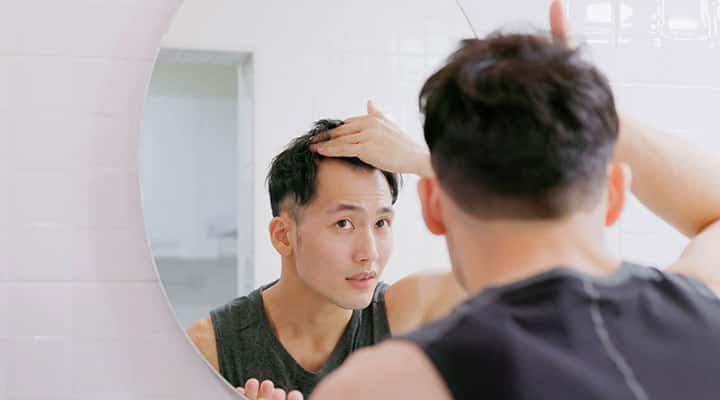
Which Vitamin Deficiencies Cause Hair Loss?
Published: May 2024
While pop culture often associates hair loss with images of men going bald in middle age (think of George Costanza's famously gleaming scalp and barren hair follicles as your archetypical example), it may surprise you that hair loss can be fairly common in women as well. Regardless of their sex, most people want to keep their hairs on their head…and not in the bathroom sink!
Interestingly, what you eat (or don't eat enough of) may play a role in your hair health. Here's what you need to know about the connection between vitamin deficiencies and a healthy mane.
Can vitamin deficiencies cause hair loss?
Yes. It should come as no surprise that there is a connection between vitamin deficiencies and hair loss. Vitamins, compounds your body requires for normal growth and nutrition and to function at its best, play an important role in the hair follicle cycle, which not only impacts the quality of your locks, but the quantity as well.
The cells within the hair follicles on your scalp divide very rapidly, and nutrients like vitamin E and vitamin A and other micronutrients foster the "cellular turnover" that makes this process work.
But, since the body can't make vitamins on its own, getting them from diet isn't just important, it's a necessity, especially to avoid deficiencies and maintain head-to-toe (or in this case "hair-to-toe") health.
What vitamin deficiencies cause hair loss?
Staying well-nourished will help you maintain your overall health, including that of your scalp and your hair. The flip side of this is that certain vitamin deficiencies have been linked to hair loss:
Vitamin D
—One study examined blood vitamin D concentration in 54 men and women suffering from hair thinning in comparison with 55 subjects without hair thinning. The research found that just shy of 80% of the participants in the thinning hair group had low vitamin D levels compared to the group that had healthy hair.Niacin
—Lack of niacin (also known as vitamin B3) has been associated with hair loss.Biotin
—A lack of biotin, aka vitamin B7, has been associated with various hair-related problems, including alopecia.
Important caveat: while there are connections between hair loss and vitamin deficiency, taking these vitamins if you didn't have a deficiency in the first place won't necessarily help you regrow what you've lost. However, at the very least, avoiding deficiencies may help you hold on to your hair!
What about minerals and other nutrients?
Vitamin deficiencies aren't the only culprits when it comes to hair loss. Minerals play a role, as can fatty acids, insufficient protein intake and broader malnutrition. Here's what you need to look out for.
Fatty acids
—Scientists have found a connection between loss of hair on the scalp and the eyebrows and essential fatty acid deficiency. Furthermore, a small clinical study found that increased intake of essential fatty acids and antioxidants prevented hair loss and improved hair density.Zinc
—A study of 312 patients with alopecia areata and other hair-related issues found that their blood contained less zinc compared to a group experiencing healthy hair growth. What's more, daily zinc was found to reverse hair thinning in a very small study of zinc deficiency-related alopecia.Protein
—Protein isn't just for the bodybuilders looking for bicep growth; it can also facilitate hair growth! Protein is an important macronutrient, so making sure you include enough in your diet will help with many aspects of overall health and fitness.Iron
—Researchers conducted case studies on 30 healthy women battling hair loss compared to 30 who weren't. Among the participants, no underlying issues involving thyroid function, unusual inflammation, or chronic disease were found. However, the study did find that the women with poor hair health had markedly lower levels of ferritin, a protein that stores iron in the cells. Furthermore, of the nine anemic patients, eight also experienced hair thinning, highlighting the role iron deficiency plays in the overall health of hair.
Although the women in the iron study had no thyroid issues, it's worth noting that low thyroid function is tied to hair loss through diseases like alopecia areata because the hormones produced by the thyroid gland are strongly related to the metabolism, differentiation and growth of a host of different kinds of cellular tissue.
There are many nutrients related to thyroid function, with some of the more prominent being iodine, selenium and tyrosine. If you want to address the causes of hair loss, getting enough of these and related nutrients like vitamin C is a great step in the right direction.
Can Other Factors Cause Hair Loss?
Outside of vitamin deficiency causing hair loss, you might be wondering if other factors can impact your hair health. The answer is yes: hair loss, thinning, and even just lackluster locks can be directly impacted by your environment and lifestyle.
Take stress, for example. Though a certain amount of stress is part of life—and there are benefits to bursts of intense stress, such as during sprinting or weightlifting—too much can absolutely exert a negative impact on your health. Substantial stress is thought to be part of what causes telogen effluvium—a condition where hair follicles on the scalp enter a "resting phase," and can lead to hair falling out later. Be sure to keep your cortisol levels in check to help better manage stress.
Hormone imbalances might also be to blame. Be sure to keep an eye on your dihydrotestosterone and thyroid-stimulating hormone as key drivers of your hair loss.
Finally, consider inflammation. Inflammation has been implicated in a wide range of health problems, and there's evidence to suggest it could also be driving hair loss. Specifically, chronic inflammation can impact the hair follicle cycle, which can impair hair growth and result in hair thinning.
While there are too many factors at play to really address how you can optimize your exact environment for your health, if your hair is a problem, it's worth thinking about whether you're getting optimal sleep, sunlight and rest.
What is the best vitamin for hair loss?
There's not really any one "best vitamin" that will encourage the growth of new hair. While there is some evidence that micronutrients like vitamin C, vitamin E, biotin and others have success in reversing hair thinning and aiding hair growth, we generally only know this to be the case when someone has been deficient in these vitamins in the first place.
Focus on maintaining a healthy nutritional status to avoid nutrition-related hair loss.
What is the strongest vitamin for hair growth?
The "strongest" vitamin for encouraging the growth of new hair is the one (or ones) that you're deficient in! If you don't know what you're deficient in, check your levels through lab testing to get a better idea of your overall health status. Screening for optimal iron, vitamin D and omega-3 fatty acids levels can help identify which vitamins or minerals are best for your unique needs to help better guide your nutrition and increase your intake of whatever you need!
Which vitamin makes hair thicker?
There's relatively little evidence supporting one specific vitamin over another for thickening your existing hair. If you're looking to support thicker and healthier-looking hair, avoid deficiencies in mainstay vitamins such as vitamin E or D, plus minerals including iron, and focus on a well-balanced diet and healthy lifestyle.
Hair and back again
It's no fun losing your hair. But the good news is that there is plenty of evidence to suggest that dietary interventions can help a wide variety of people, especially those with an underlying deficiency.
Don't forget to test your levels regularly; you may improve your situation by making targeted changes to your nutrition, environment and lifestyle.
While Wellness Specialists cannot diagnose or treat disease, they can answer questions about lab tests. Reach out to a Wellness Specialist at 1-800-226-2370—they can offer nutrient recommendations and help you design a personalized program that includes diet, exercise and more.
About the Author: Trent Fowler has been covering health and wellness for more than a decade. A technical writer and content specialist, he is also the co-host of the Futurati Podcast and writes about fintech, AI, and other emerging technologies.
References
- Almohanna HM, et al. "The Role of Vitamins and Minerals in Hair Loss: A Review." Dermatol Ther (Heidelb). March 2019. https://pubmed.ncbi.nlm.nih.gov/30547302/
- Guo EL, Katta R. "Diet and hair loss: effects of nutrient deficiency and supplement use." Dermatol Pract Concept. January 2017. https://www.ncbi.nlm.nih.gov/pmc/articles/PMC5315033/
- Hall-Flavin DK. "Can stress cause hair loss?" Mayo Clinic. May 2023. https://www.mayoclinic.org/healthy-lifestyle/stress-management/expert-answers/stress-and-hair-loss/faq-20057820
- Hussein RS, et al. "Impact of Thyroid Dysfunction on Hair Disorders." Cureus. August 2023. https://www.ncbi.nlm.nih.gov/pmc/articles/PMC10492440/
- Le Floc'h C, et al. "Effect of a nutritional supplement on hair loss in women." J Cosmet Dermatol. March 2015. https://pubmed.ncbi.nlm.nih.gov/25573272/
- Moeinvaziri M, et al. "Iron status in diffuse telogen hair loss among women." Acta Dermatovenerol Croat. 2009. https://pubmed.ncbi.nlm.nih.gov/20021982/
- Patel DP, et al. "A Review of the Use of Biotin for Hair Loss." Skin Appendage Disord. August 2017. https://pubmed.ncbi.nlm.nih.gov/28879195/
- Peyravian N, et al. "The Inflammatory Aspect of Male and Female Pattern Hair Loss." J Inflamm Res. November 2020. https://www.ncbi.nlm.nih.gov/pmc/articles/PMC7667670/
- Tamer F, et al. "Serum ferritin and vitamin D levels should be evaluated in patients with diffuse hair loss prior to treatment." Postepy Dermatol Alergol. June 2020. https://www.ncbi.nlm.nih.gov/pmc/articles/PMC7394174/
- "Vitamins." National Library of Medicine. June 2021. https://pubmed.ncbi.nlm.nih.gov/31644195/
Like what you read?
Please subscribe to get email updates on this blog.









